Heading Home
Here in Minnesota, a long, punishing Winter has been followed by a lovely Spring, which has been followed by a spirited Second Winter. The morning of the 11th, before I started writing this, snow fell with a brown tinge from dust that blew in from Texas. (Meteorologists call this “snirt”.) Later that day while unlocking my bike to travel down slushy roads that two days prior were clear and surrounded by green lawn, I saw a flash, looked up into the pelting hail, and heard thunder.
Since I came back to the Twin Cities in (gosh!) early February, I’ve been in something of a holding pattern, planning to move to the Chequamegon Bay but never quite making it out of the Cities with anything more than my backpack. I’ve had a few meaningful projects to keep me busy, most notably sugarbush, which I’ll get to in a bit, but in between them I’ve led a wandering, wraithlike existence in which I’ve crashed on friends’ couches some nights, wearing through a series of welcomes, and other nights slept outside in a variety of locations next to the river and under bridges, depending on where I was the evening before and where I wanted to be the next day. I’ve built up a mental list of places that are open long hours, and I’ve been delicately rotating which one I loiter in during the waking hours of each day, so I don’t start getting dirty looks from the proprietors.
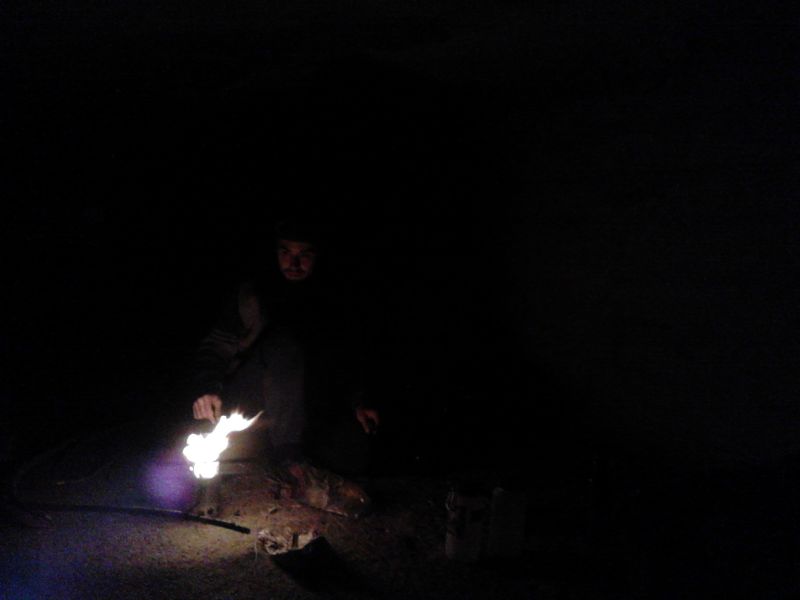
A culvert in California I camped in last year.
Now and then I’ve been able to make it to the garage I keep my stuff in, and drop off or pick up a few things, but by and large, everywhere I’ve gone I’ve had to hump along all my belongings—my eighty-liter backpack, plus any peripheral stuff I have with me that day (computer, day bag). I’ve tramped down Franklin Avenue so many times, heavily loaded, that I’ve started to wonder if people see me as some kind of mythical figure, like the hitchhiker who keeps showing up beside the road every couple hours through your long road trip. I’d make my move to the Chequamegon, except for this thing that I need to do first (sugarbush, book project), and that something-or-other that’s preventing me (no place lined up, no car to carry stuff). It’s been an interesting time to dig further into the feeling of homelessness.
Now, before I keep going, I should say that there’s homeless, and there’s homeless. When we use that word, we’re usually thinking of someone who has no home because they’re too poor to have one, someone who has no other recourse. I’ve had other recourses, and I won’t try to hide that fact. The experiences I’ve had are, to an extent, ones that I’ve been able to take my distance from and treat as intellectual curiosities, because the only thing keeping me on the streets is my own choices. That’s not something the obligate homeless can say, and that means that for them life must often seem like a neverending emergency. That’s not an experience I’ve had.
But the fact remains, I’m still homeless: the word “homeless” just says someone has no home, without reference to whether they could have one if they wanted. And that’s been true for me for more or less the last two years solid. I’ve stayed in a lot of places, some of them for a long time, but none of them have been a place I could call my own. And these last couple months of skulking around the sidewalks of the Twin Cities have been a more concentrated form of that same homelessness of my last two years. Though I’ve still, by virtue of having money and an education, always had the option of throwing in the towel, something has changed. When I started out traveling in April 2017 I felt full of purpose and curiosity. Here at the ass end of my travels I’ve burnt through those reserves and all I have left is the lack of a house.
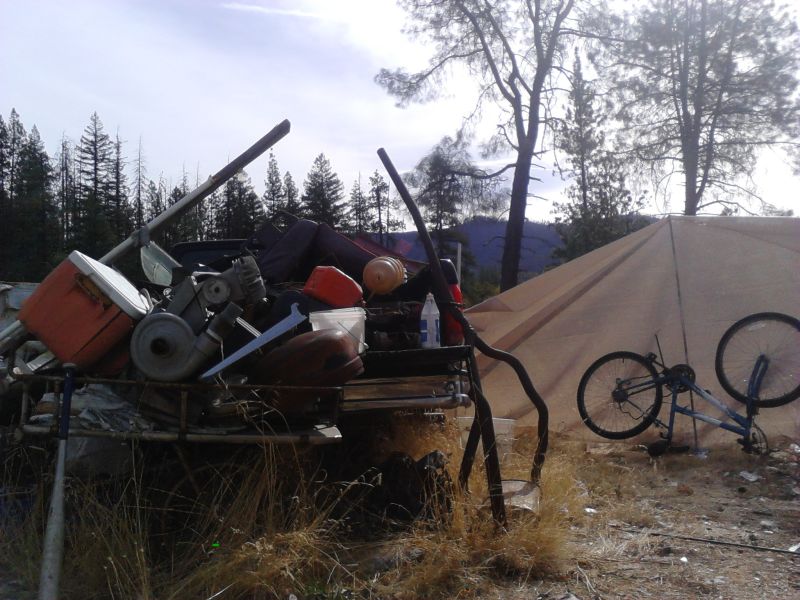
The junkyard I camped in when I was trimming in fall 2017.
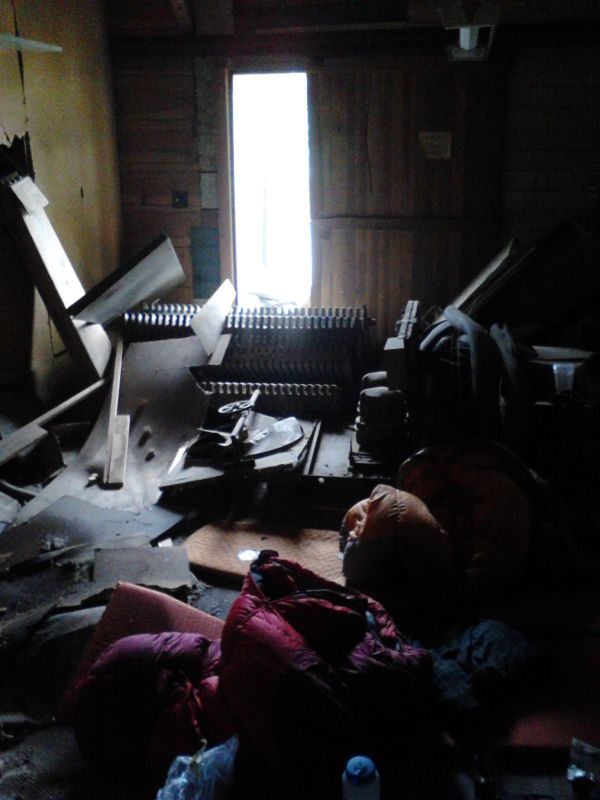
Abandoned building near the tracks in Glasgow, Montana, where I took shelter from the rain between trains.
See, there are limits in every lifestyle. If you live in a house in a town where you have social and work commitments, you can’t get the breadth of experience that you get when you’re untethered and can go wherever the wind blows you on a moment’s notice. Housies (as some vagabonds call them) can’t just hop a train across the country on a whim, and might miss the occasional eclipse. But when my “home is wherever I lay,” it’s not really home, and there are a lot of things I wish I could do that I just can’t. Someday I’d like to brew drinks, for starters. I’d like to be able to get up, open my computer, and start writing something, without feeling like I’m taking up a bunch of space in someone else’s home. I’d like, please and thank you, to be able to go somewhere a couple miles away with just what’s in my pockets and not have to find a place to hide the backpack that contains everything I use on a day-to-day basis lest it vanish. There’s a reason people have houses. People imagine my lifestyle as the archetype of freedom. But it turns out there’s no such thing as general “freedom”, only specific freedoms to do certain things; and when you pick up a new set of freedoms, you have to lay down another set you were carrying.
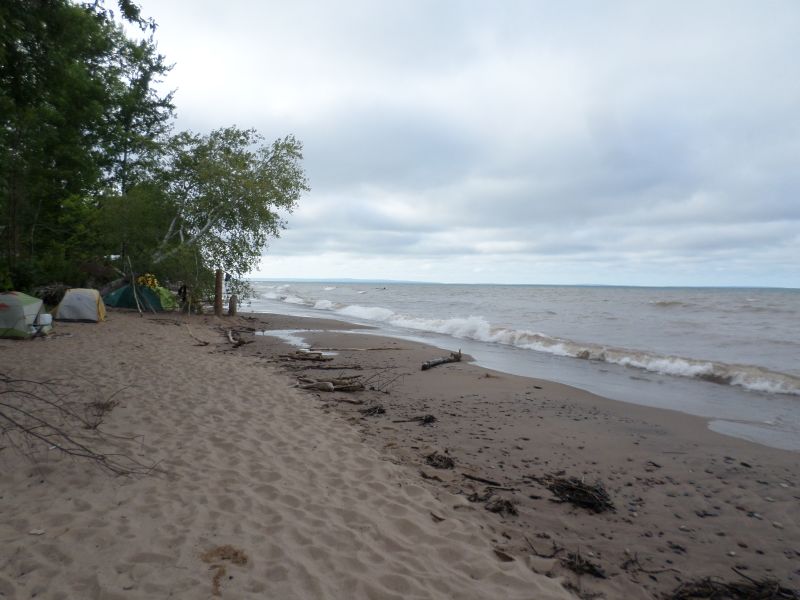
Even camping out on beaches as beautiful as this one (on Lake Superior during Traditional Ways—a traditional skills gathering I haven’t gotten around to writing about) gets old without stability.
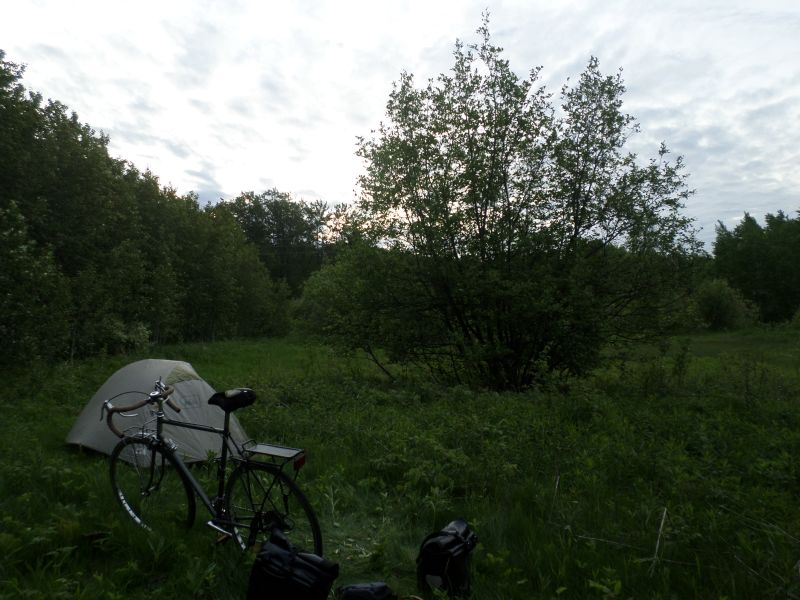
An unused field I camped in near Duluth while biking around Minnesota last year.
What’s interesting is, just having a house isn’t enough to exorcise the feeling of homelessness. Having dwelt within this condition for a while, I want to make a possibly controversial diagnosis: I believe this country in general suffers from chronic low-level homelessness.
In an individual, the psychological effects of homelessness are merely harrowing. Everywhere I go, even when I haven’t been asked to, I try to take up as little space as possible, to be as invisible as possible. No space being mine, I’m constantly aware of how much of other people’s space I’m using up, and always alert for the hints that say my welcome is starting to wear thin. After a while looking out for those hints you start seeing them even when they aren’t there. The last few days, I’ve been staying on the porch of my friends Brandon and Liz, two people not strangers to the vagabond lifeway, having lived for five months under a truck cap atop a tank of veggie oil that powered their cross-country road trip. Their living room is huge and sparsely used, and they’ve been ceaselessly welcoming. But I’ve still made sure to stay there as little as possible, to stay outside their house—I’ve written this post in a local bookstore and cafes—because our friendship is young and not stress-tested, and I want to make sure not to burn the bridge. You can even see the self-defeating nature of this mindset: perhaps if I hung out more, in the time I didn’t spend writing blog posts, I could deepen that friendship, and have less to worry about. But that tolerance-o-meter whose needle twitches back and forth in my head doesn’t account for such considerations, preferring always to make the most conservative estimate of how long I can stay somewhere.
Likewise, I find it hard these days to imagine a long-term future. If it weren’t for the knowledge that I can have a home and soon will, I’d have trouble imagining that the future exists at all beyond an event horizon about a month from now. Someone told me the other day about a friend of his, who worked roofing. The friend was financially secure but worked with crews mostly composed of people who weren’t, and he was astonished at how fast they could go through money on payday. Spend it like it might vanish at any moment, is the motto—and it may hold more truth than it seems, since poverty, as has been widely noted, charges interest in the form of inability to pay for anything of quality, including cars (junker-of-the-month club), medical insurance (you’ll love our $7,000 deductible), and food (organic and local on a budget: the McDonald’s two blocks away sells food made of organic molecules). It’s lack of money that amputates these people’s foresight, but money is a means of providing yourself with a situation, and when I’m drifting about situationless, even the savings I have can’t restore my ability to wholeheartedly believe that next year will come. As a countermeasure, a couple weeks ago I started writing a list of things I’d like to do when I have a place to live. I’ve written at least forty things, from creating the Ultimate Travelers’ Map of North America to picking up the banjo to possibly even starting a magazine, and I still haven’t reached the bottom of the well. I’d almost forgotten that I’m an interesting person, I was trying so hard to be invisible, and using up so much of my mental effort to stress out about where to sleep each night.
The homelessness that I think afflicts the US at large isn’t as deep as the hole I’ve been in. You might not even notice it from within it. But it looks like: you assume that growing up includes a part where the kid moves far away from home and maybe never comes back. It looks like: the question “Where do you live?” is being replaced, especially in lower-class dialects, by “Where do you stay at?” It looks like: when you ask someone where they’re from, you don’t consider it unusual to hear, “Oh, all over,” followed by a list of cities in every corner of the country. It looks like: it’s considered business as usual if an entire neighborhood is leveled to put in a highway (as happened in the old Rondo neighborhood of St Paul when I-94 was built).
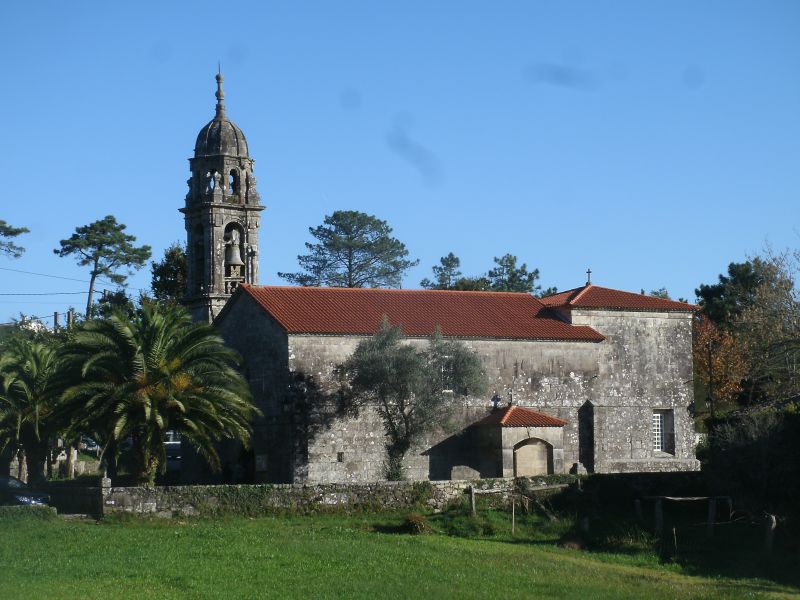
A country church I passed in Galicia while I walked the Way of St James.
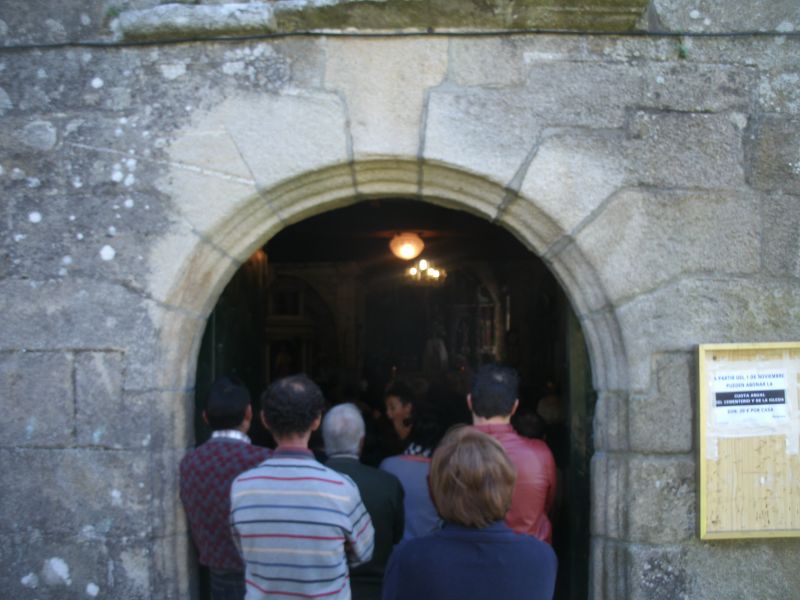
Parishioners crowd in.
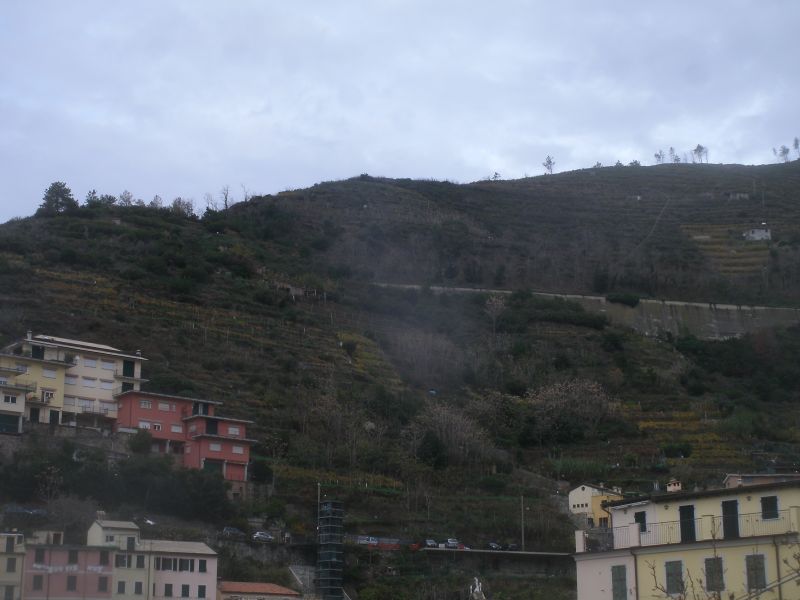
The wine grape terraces of the Cinque Terre, where I camped out on a closed-off walking path, have been built up and scrupulously maintained for centuries.
Perhaps it’s most understandable by contrast. Look, for example, at the towns and fields of rural Europe, where you can find a church that has stood for half a millennium and hosted worshippers every week, and a farm that has been tended perhaps even longer (though with some changes in the last few decades as the US’s contagious homelessness has jumped to other places). Or there’s the Kayapó tribe of the Xingu River, a tributary of the Amazon, which the Brazilian government would dearly love to dam for electricity. The Kayapó (among other tribes) have done everything humanly possible to stop the dam from being built and their rainforest home getting turned into a lake the size of Delaware: not confining themselves to bloodless picketing in front of government buildings, they blockaded a major highway and ferry crossing for over a month, and promised to stop the dam’s construction or “die fighting for our rights.” (Construction was suspended in 2016.) If the government wanted to flood you out of your home, would you be willing to die to stop them from doing it? Even near us you can see people who have a place they call home—the water protectors, for instance, who put their bodies on the line at Standing Rock when the police were spraying water cannons at them in below-freezing weather. It’s no coincidence that that was an effort led by Native Americans, whose home has been this continent for longer than anyone rightly knows.
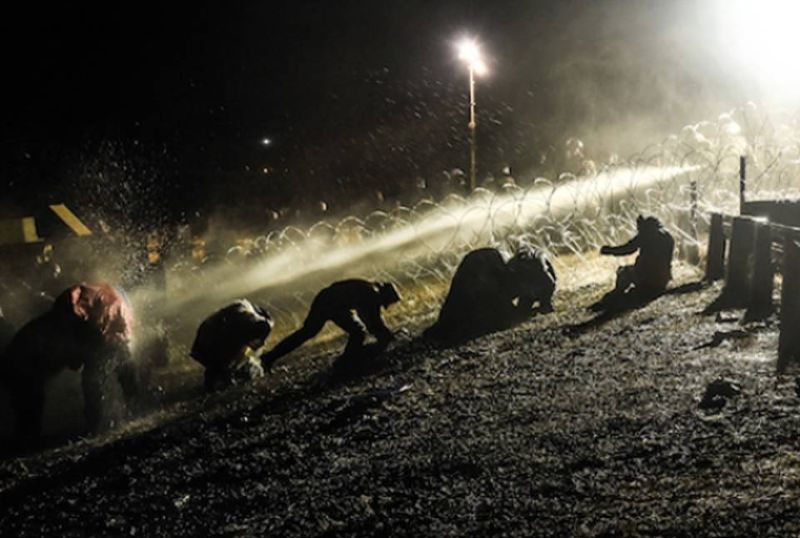
Standing Rock (via workers.org).
But for us descendants of settlers, especially those of us who live in cities, imagining such a deep connection makes us a little nervous. We fairly often have some superficial connections to the places we live in—communities of friends who all happen to live in the same geographical area, stories that reach back perhaps a generation or two. But who could possibly love a place so much that they’d think keeping it safe is more important than their own life? Perhaps, strangely enough, the homelessness of a nation can be measured by the absence of things its people are willing to sacrifice themselves for.
What I’m getting at, partly, by talking about homelessness, is a definition of what home is. It’s not just a house that you can sleep in at night. It’s a place where the land, the people, and the history all nourish you, and you nourish them. It’s a place where the boundary between you and what’s around you becomes a soft blur instead of a sharp line, because without its stories your mind would be less, without the food that grows there your body would be less, and without the people (human and not) who live there your heart would be less—and the place wouldn’t be what it is without your presence, your tending, and your storytelling. Can you say you’ve experienced a place like that? Maybe, but if you have, and if you’re a settler-descended dweller of the New World, you probably can’t say you have for very long, or as deeply as you wish you had. “One of the peculiarities of the white race’s presence in America,” Wendell Berry writes,1 “is how little intention has been applied to it. As a people, wherever we have been, we have never really intended to be. The continent is said to have been discovered by an Italian who was on his way to India. The earliest explorers were looking for gold, which was, after an early streak of luck in Mexico, always somewhere farther on. Conquests and foundings were incidental to this search….”
So much for the diagnosis. How about the psychological fallout? Well, here’s the thing: humans need to feel at home; it’s a basic part of our psychology, and as I’ve described it, it encompasses fully the bottom three levels of Abraham Maslow’s famous five-level “hierarchy of needs”. When our lives have the aspects of home that are necessary to simply stay physically alive but are missing the others, we constantly seek them the way we would food or water.
But the profoundly incomplete situation most of us in the US live in is what we are told is home, and that makes us unsure how to find what’s missing, mostly unable even to identify what’s missing. And so the unconscious levels of our minds are constantly trying to escape an unsatisfactory situation, a lifestyle that our biological heritage tells us is essentially the same as prison except with more cushions. But we don’t have any clear vision of where to escape to. So we end up constantly running away: from towns we used to live in, from jobs we once had, from interests we used to sink into, and especially from any introspection about all of this. It ends up that the raw blind momentum of running away is the goal we all have in mind at some level, even if we don’t act on it, even if we spend decades in the same place with the same people just wondering when we’ll figure out where to go to finally find fulfillment (perhaps that annual two-week vacation—if this year didn’t do the trick, maybe next year will).
Even our theologies are all about escape. Christianity, as practiced in this country, is of course all about throwing off the Earthly shackles of our bodies and coming to our true home with the Lord. (I hear there are places where it was once focused on good works and making Earth reflect God’s kingdom.) I’m reminded of a conversation I had with a classmate in high school. I asked if she thought much about global warming and what people could do about it. “Oh, I don’t worry about that,” she said. “The Rapture will be coming before any of that happens.” Those of us who have scrapped Christianity in favor of more secular eschatologies have kept the same story but in slightly different garb: Heaven has been swapped out for a vaguely scientific version of the same, a “true” home in interplanetary colonies (witness Russian rocket scientist Konstantin Tsiolkovsky’s pseudo-profound and often-repeated inanity, “The Earth is humanity’s cradle, but mankind cannot stay in the cradle forever”), or perhaps Ray Kurzweil’s always-thirty-years-off artificial intelligence “singularity”.
And if your goal, for your Earthly life as well as your post-Earthly life (if applicable) and the lives of all future humans, is to escape, is it any wonder if you feel trapped in the narrow confines of the present moment and the presently possible?
We’re always looking into the future; a wave of Buddhist thought since the 1970s has been able to help a few people find contentment in the present, but has on the whole failed to keep the country’s focus from bleeding ever away from now and into the endless empty promises of the unknown. It’s worse now than ever, and I’m afraid I don’t see my generational cohort reversing the momentum, but rather much the opposite, with a not entirely unquestioning but nonetheless complete embrace of all the latest in video game, smartphone, and social media technology that keep us more and more in escape mode. Millennials uniformly maintain that they have an ambivalent relationship to these technologies that, to all outward appearances, they seem almost religiously devoted to; ambivalence and irony are my generation’s stock in trade, our way of convincing ourselves we’re on some path to sanity while we play exactly the insane parts we’re expected to play in an insane world.
Look, it wasn’t always this way. In Edward Bellamy’s 1887 smash bestseller Looking Backward, a man wakes up from a deep mesmeric sleep to find 113 years have passed and the United States has turned into a socialist paradise. The book’s audience was a less discontented American populace, people who had come, or whose ancestors had come, footloose from across the seas, but who were now gamely attempting to feel at home in farmsteads and workshops on this alien new continent. The story is unabashedly socialist propaganda, though of a very pleasant nature, but what struck me about it was Bellamy’s vision of a worthy goal for humankind once socialism had solved our pressing material problems. It’s a vision devoid of spaceships and supercomputers, and very human. “The animating idea of the present age,” preaches the pastor Mr Barton over a telephone broadcast to a congregation of 150,000, “is an enthusiastic conception of the opportunities of our earthly existence, and the unbounded possibilities of human nature. The betterment of mankind from generation to generation, physically, mentally, morally, is recognized as the one great object supremely worthy of effort and of sacrifice…. For twofold is the return of man to God ‘who is our home,’ the return of the individual by way of death, and the return of the race by the fulfillment of the evolution, when the divine secret hidden in the germ shall be perfectly unfolded.” So, you can have that vision, or you can have Mars colonies where solar wind would give you “so much cancer, the cancer would have cancer.”2
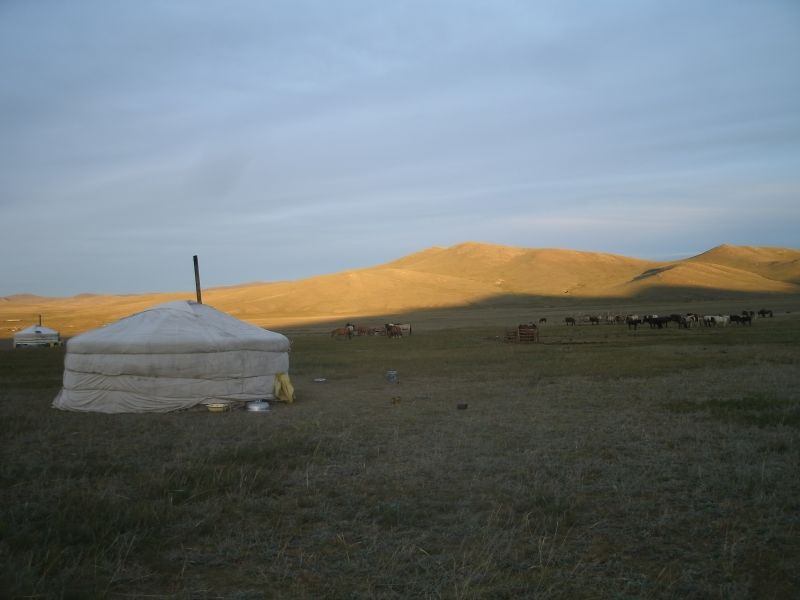
Nomadic herders I met in Mongolia.
And it’s also not like this everywhere. In fact, I think it’s likely that those of us living in citified America with citified values are living in the most homeless era of human existence ever attained. Even kings in medieval Europe connected to the Earth in their fashion, by donning stylish clothes and going hunting in woods kept tended especially for them. Today’s version of those who’ve made it to the top, though, celebrate their success by buying mansions perched on hills in the country and then staying inside while a groundskeeper maintains a beautiful view to be glimpsed from the picture window on the way to the home theater. And if that’s not enough, as it generally isn’t for their children who didn’t strive and trample for that success but had it dropped upon them at birth, there’s always coke and world travel. With the latter they can catch the occasional contact buzz when their tour bus takes them past villagers in Laos or Zimbabwe who actually live at home.
But like I said, it’s hard to see this detachment from within it. Unwittingly, I seem to have spent much of the last two years learning more about it by diving further down into it, which makes me able to see it better than I ever could before. When I was setting out, I would’ve told you I was learning about home by going to places where I suspected people had created a home. Now two years on, I believe there was some merit in that idea but the way I’ll really learn is by working to create home wherever I am. By visiting other people’s homes, I can learn what works for other people. At some point, I need to start learning what works for me. Until then I’m just learning more about homelessness, and right now I don’t think that’s something I need to do.
Counterintuitively, one of the places I’ve felt most at home recently has been a temporary encampment in a forest with no plumbing, beds, or electricity (until some high-schoolers doing a project came and installed a solar panel in a hollow tree). I’m talking about sugarbush.
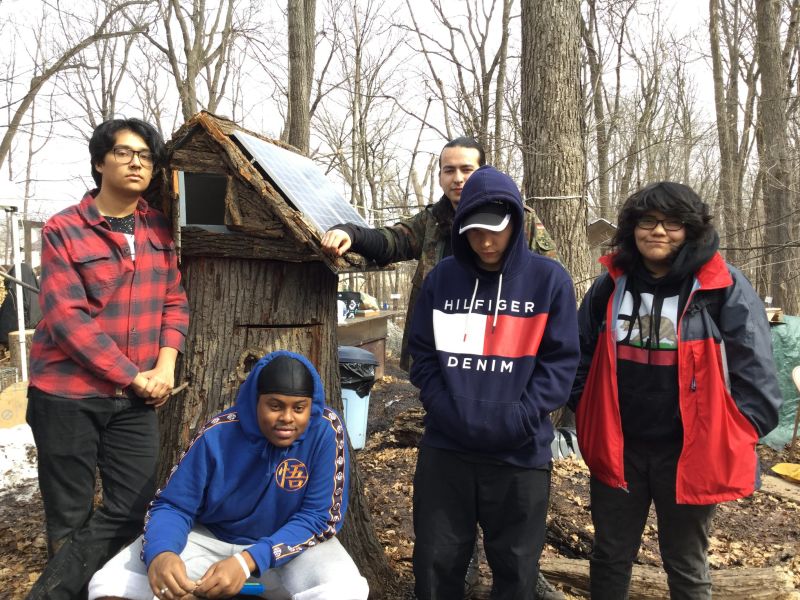
These are the kids from Migizi, a high school equivalency program that brought them down to camp and got them all interested enough to build this kick-ass solar charging station. (All sugarbush photos by Deb, I believe.)
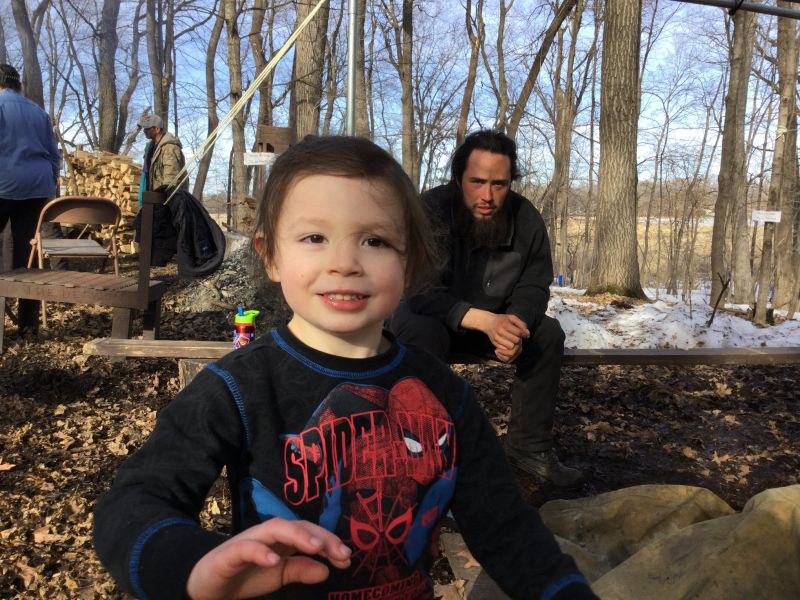
This 5-year-old kid, who’s in a Lakota immersion class, blew my mind by showing me his collection of Pokémon cards. I collected those things twenty years ago. Everyone told me they’d be worthless by now. I bet I’d be sitting on a fortune. He and I had a lot of fun chasing each other around in the mud.
This year, for the third year running I returned to Porky’s Sugarbush, thirty miles west of Minneapolis on the shores of Lake Independence. When I arrived, the place was a foot and a half deep in snow. When we held the closing ceremony and packed out three weeks later, there were a couple little patches of it in the shade. In between, hundreds of people came through, and I made new friends and helped the community. It really struck me this year how much of a community this sugarbush really is. I mean to say: here we all are, out around the fire, in the woods. We’re making food—maple syrup, which will last us all year and keep us remembering camp every time we eat some. People bring their smartphones, but the distraction value of them quickly becomes very pale for all but the most hardcore addicts in the presence of five, ten, or dozens of people who are all full of interesting stories and friendly welcome. This was the 44th year of Porky’s sugarbush, and those who’ve been coming for a long time told stories, more I think this year than I remember, about people who used to come but have moved on or passed on. Porky White has been gone for 18 years now, but during one of the songs at the last Sunday ceremony, Deb—his widow and the owner of the land—welled up with tears because his spirit had come back for a visit while she was singing a song he taught her. Elders came who were known and loved by the whole community, like AIM great Clyde Bellecourt, who made time for camp between hospital visits; and babies came who one day will hopefully be known and loved the same way. We had ceremonies and we shared sacred teachings—at the Sunday ceremonies that drew dozens of people, in Pebaam’s “ ’Baam Shelter”, and while sitting around the sap kettles on the fire. We goofed off and told jokes; Deb and I rode the little camp ATV all the way to the pizza place in town for $5 pizza night, and Brandon and Pebaam riffed off each other to create an overabundance of hard-to-bear new puns.
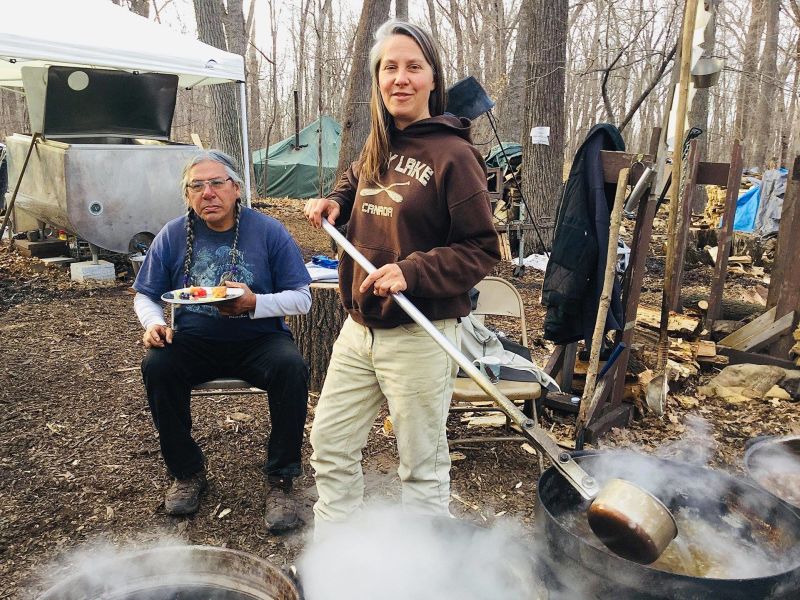
Pebaamibines and Laura are each other’s sweeties.
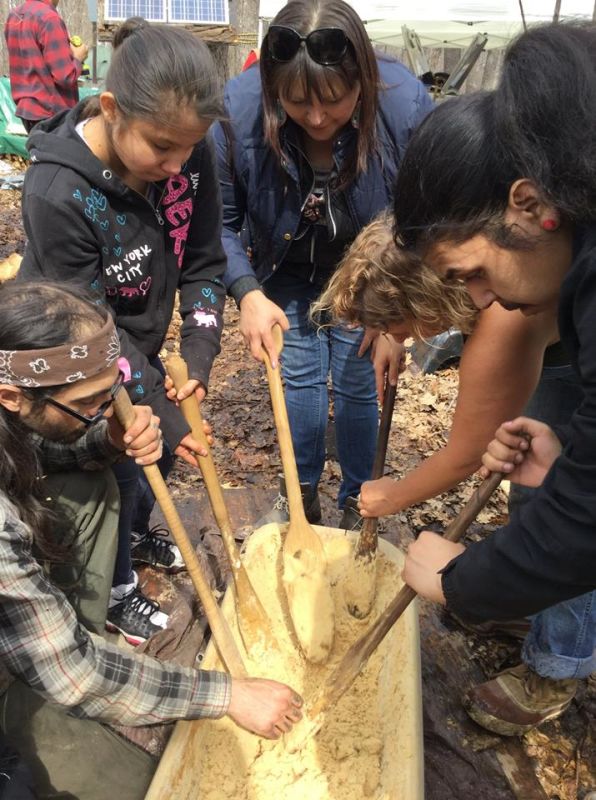
All hands on deck to get the sugar to crystallize.
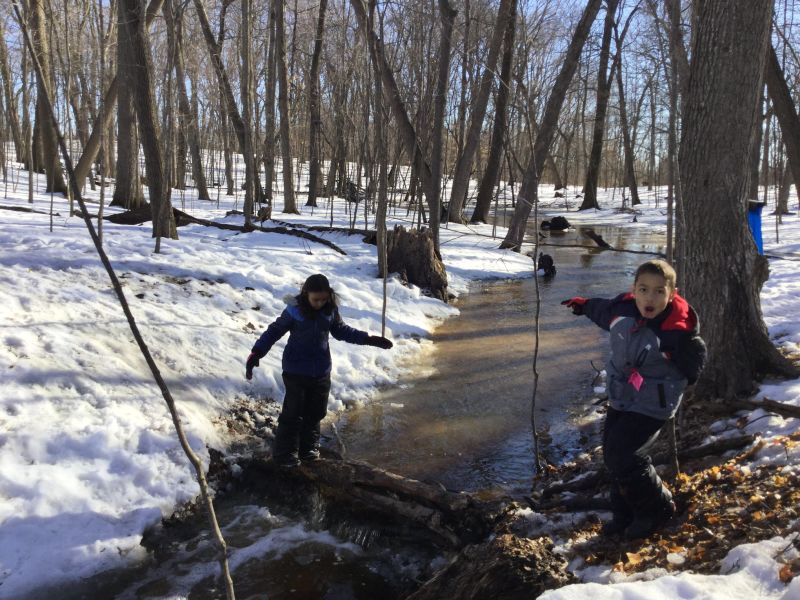
Kids playing in the creek.
Everyone’s always sad when camp ends for the year. A few hundred years ago, we wouldn’t be splitting up for the year now but rather moving to the summer village site, where we’d be together in even greater numbers. But in 2019, last week marked when we all went back to our houses scattered around Minnesota; some of us will see each other throughout the coming summer, fall, and winter, but we won’t have anything that keeps us as united and purposeful together as that pocket of sweetness in the snow and cold.
It’s not necessarily a single place that makes home. It’s a land you have a deep, let’s even say spiritual, relation with, even if that relation is spread out over hundreds of miles of territory. It’s people you work together with, even if some of those people annoy you (I don’t have in mind anyone specific, in case my sugarbush friends read this, just the idea that any healthy community is one where people can disagree but still work together). It’s a common goal, even something as simple as a harvest. It’s a history, it’s stories—I know no word specifically to mean history in Ojibwe, but I suspect to express that notion one would in fact use the word for “stories”, aadizookaanag, a noun that’s grammatically animate along with people, animals, and trees, and which has another meaning, “spirits”.
And that’s what I’m going to be working on finding and creating, starting this week when I move to the Chequamegon Bay. It’s a bit bittersweet, going there; for as much as I love the place, these past couple months in Minneapolis have made me really appreciate the friendships I have here (and I have a lot). But the land itself is harder for me to hear here, harder for me to weave into my daily life when city distractions are drawing me the opposite direction. I’m taking a gamble that the friendships I strengthen up on the Chequamegon and the time I can spend with the land there will balance out to the good even despite the friendships I attenuate here by leaving.
And also, I’m guessing I won’t spend all my time there, but migrate, perhaps with the seasons or perhaps back and forth according to a more modern clock, visiting my friends here in the Cities when the time is right, and planting, tending, and being with friends up by the Lake when that’s what I need to be doing. I’ve proven to myself that I’m good at traveling, I figure, so why not travel when I want to, as long as I can support myself at the same time, and do it in a way I believe in—with no car of my own, and making sure not to sacrifice my relationship with place for simple pleasure or to run away from anything? The tribes of the Great Plains here on Turtle Island traveled a hoop each year, harvesting in each place and planting before they left, coming around full circle at the beginning of each year, and for as much as we could call them homeless for having only the houses they could carry, theirs was really a concept of home with a depth that we can hardly even conceive, because every hillock and creek was part of their community and part of their dwellingplace.
In any case, the only way to know is to try, and I’m excited—I’d almost forgotten how to feel excitement—to finally head home.
File under: Year of Listening, angst, moving, sugarbush, bad culture · Places: Minnesota, Chequamegon
Note: comments are temporarily disabled because Google’s spam-blocking software cannot withstand spammers’ resolve.
3 Comments
Kartwheel
HistoryDelicious. can’t wait for you To unfurl. The worlds of Cheq bay and mpls is a nice one to move between, there’s a decent path work between
Dave T.
HistoryCareful now, this post is could easily be construed as Christian allegory. Parable of the lost sheep? Luke 15:3-7. While you’re right to throw most of modern Christianity out the window, including the rapture which isn’t supported by scripture, you’re easily following the path of Origen, Augustine, the apostle Paul, St. Francis of Assisi and many others, not limited to Christianity. The simple ascetic or monastic life certainly is “eco friendly”. Perhaps the why is not as important as the way. Welcome home!
Chuck
HistoryI think to make an allegory I have to tell a story, and I’m not sure if this ramble quite counts, but otherwise I think I agree with you, except that I don’t know nearly enough about those early Christians you named to say anything intelligent back to you. (I have an intention to read more old to very-old texts, though, so that’ll probably change.)
I’m not sure I’d call my plans asceticism, but compared to how the modern world lives I suppose they could easily be seen that way. Seems to me that asceticism is living a life with minimal attention to the physical so maximal attention can be paid to the spiritual. But I hope to strike a happy balance. What that looks like, I’m only just starting to see.